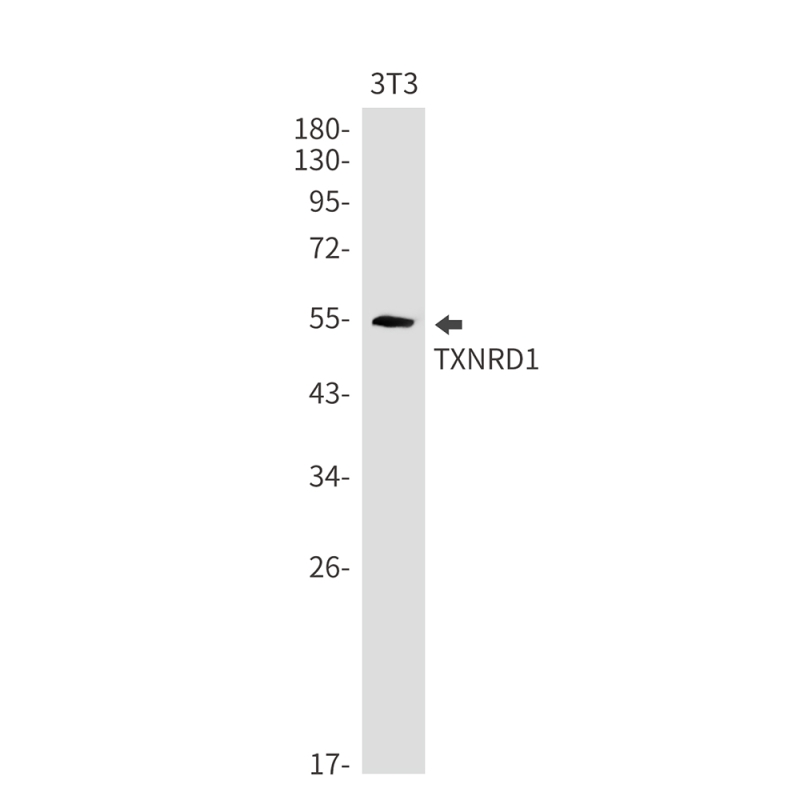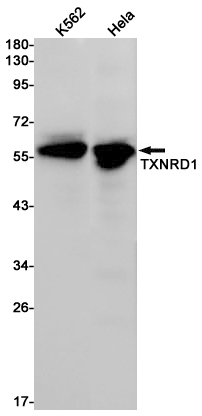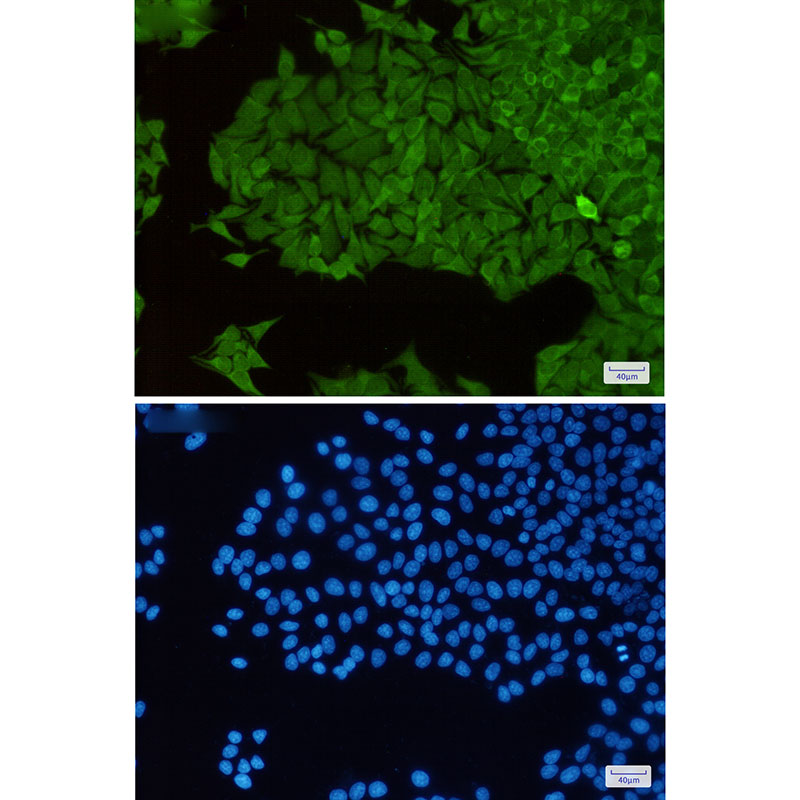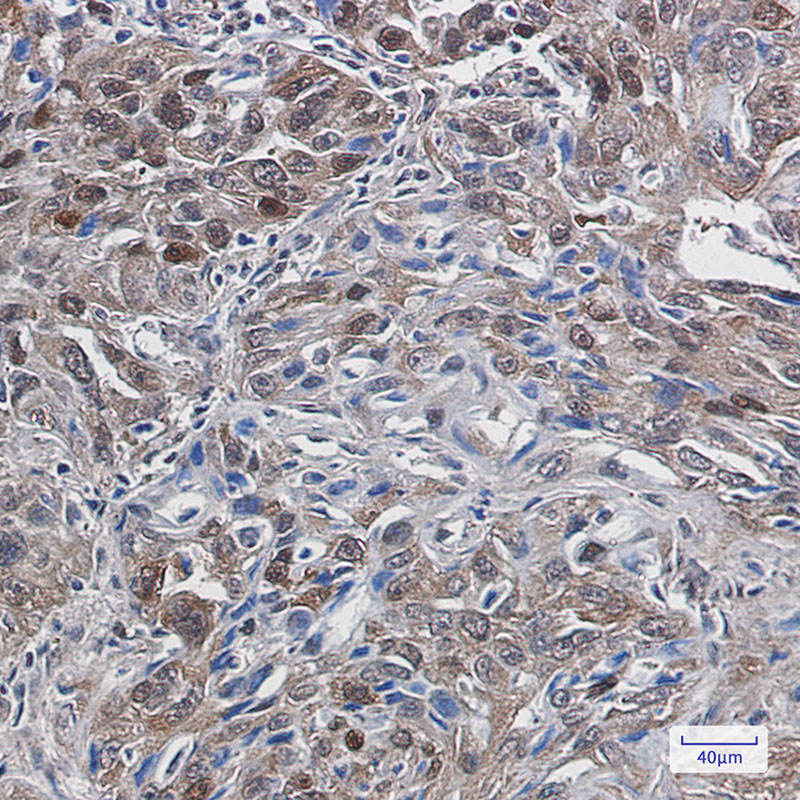



| WB | 1/500-1/1000 | Human,Mouse,Rat |
| IF | 1/20 | Human,Mouse,Rat |
| IHC | 1/50-1/100 | Human,Mouse,Rat |
| ICC | 1/50-1/200 | Human,Mouse,Rat |
| FCM | 咨询技术 | Human,Mouse,Rat |
| Elisa | 咨询技术 | Human,Mouse,Rat |
| Aliases | TR; TR1; TXNR; TRXR1; GRIM-12 |
| Entrez GeneID | 7296 |
| WB Predicted band size | Calculated MW: 71 kDa; Observed MW: 55 kDa |
| Host/Isotype | Rabbit IgG |
| Antibody Type | Primary antibody |
| Storage | Store at 4°C short term. Aliquot and store at -20°C long term. Avoid freeze/thaw cycles. |
| Species Reactivity | Human,Mouse |
| Immunogen | Recombinant protein of human TXNRD1 |
| Formulation | Purified antibody in TBS with 0.05% sodium azide,0.05%BSA and 50% glycerol. |
+ +
以下是关于Thioredoxin Reductase 1(TrxR1)抗体的参考文献示例,包含文献名称、作者及摘要内容概括:
1. **"Thioredoxin Reductase 1 as a Diagnostic Marker in Colorectal Cancer"**
*Authors: Zhang Y, Liu J, Chen X*
**摘要**:本研究通过免疫组织化学和Western blot分析,发现TrxR1在结直肠癌组织中高表达,并与患者预后不良相关。使用TrxR1抗体验证其在肿瘤细胞中的定位及表达水平,提示其作为潜在诊断标志物的价值。
2. **"Targeted Disruption of Thioredoxin Reductase 1 Impairs Mitochondrial Function in Mice"**
*Authors: Eriksson S, Arnér ESJ*
**摘要**:通过构建TrxR1条件性基因敲除小鼠模型,利用特异性抗体检测组织中的TrxR1蛋白缺失,发现其缺失导致线粒体功能异常和氧化应激加剧,揭示了TrxR1在维持线粒体稳态中的关键作用。
3. **"Thioredoxin Reductase 1 Inhibition Sensitizes Glioblastoma to Chemotherapy"**
*Authors: Wang L, Lu Y, Zhang H*
**摘要**:研究使用TrxR1抗体评估胶质母细胞瘤细胞系中TrxR1的表达水平,发现抑制TrxR1可增强化疗药物替莫唑胺的疗效,表明靶向TrxR1可能成为改善神经胶质瘤治疗的新策略。
4. **"Development of a Novel Monoclonal Antibody for Human Thioredoxin Reductase 1 and Its Application in Redox Studies"**
*Authors: Smith AD, Holmgren A*
**摘要**:本文报道了一种高特异性抗人TrxR1单克隆抗体的开发,并通过ELISA、免疫沉淀等技术验证其效能。该抗体成功应用于检测细胞氧化应激模型中TrxR1的活性变化,为相关研究提供了可靠工具。
*注:上述文献信息为示例性质,实际引用时需根据真实文献调整作者、标题及摘要内容。*
Thioredoxin Reductase 1 (TrxR1), encoded by the *TXNRD1* gene in humans, is a critical component of the thioredoxin antioxidant system, which maintains cellular redox homeostasis. This selenocysteine-containing enzyme catalyzes the NADPH-dependent reduction of thioredoxin (Trx), enabling Trx to regulate oxidative stress by scavenging reactive oxygen species (ROS) and repairing oxidized proteins. TrxR1 is ubiquitously expressed and localized primarily in the cytoplasm, though isoforms may exist in mitochondria or nuclei. Its activity is essential for DNA synthesis, cell proliferation, and apoptosis regulation through interactions with transcription factors like NF-κB and p53.
Dysregulation of TrxR1 is linked to pathologies including cancer, neurodegenerative disorders, and cardiovascular diseases. Overexpression of TrxR1 in tumors promotes chemoresistance and metastasis, making it a therapeutic target. Conversely, loss of function due to genetic mutations or oxidative inactivation contributes to degenerative processes.
Antibodies against TrxR1 are vital tools for studying its expression, localization, and role in disease. They are used in techniques such as Western blotting, immunohistochemistry, and immunofluorescence to quantify protein levels, assess tissue distribution, or evaluate therapeutic interventions targeting the Trx system. Specificity validation (e.g., knockout controls) is crucial due to structural similarities with other thioredoxin reductase isoforms. Research utilizing TrxR1 antibodies has advanced understanding of redox biology and facilitated drug development, particularly for anticancer agents that inhibit TrxR1 to induce oxidative stress in malignant cells.
×